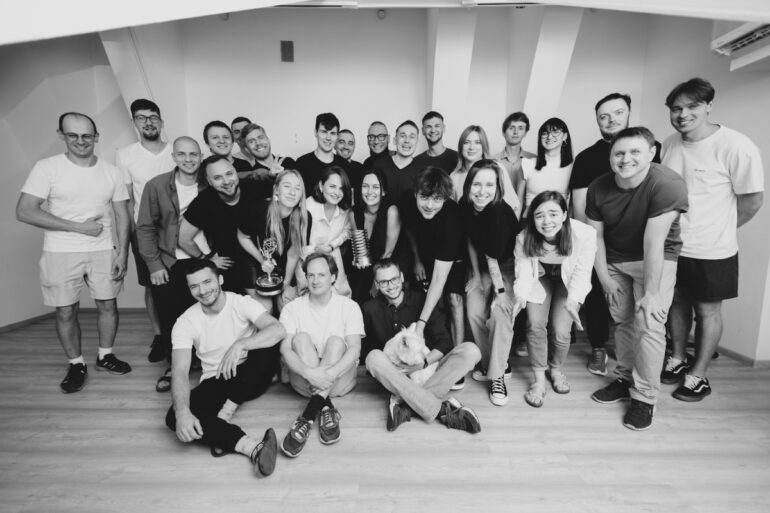TL;DR:
- Respeecher, a Ukrainian synthetic voice startup, secures $1 million in funding to expand its services amid challenging circumstances.
- The company is renowned for replicating iconic voices, including Darth Vader and Edith Piaf, using voice models.
- Respeecher places a strong emphasis on ethical practices, obtaining consent from the rights owners, even for posthumous voice cloning.
- They have garnered support from industry figures like Gary Vaynerchuk and joined Adobe’s Content Authenticity Initiative.
- Respeecher’s deliberate growth strategy has enabled resilience during turbulent times, with a focus on providing synthetic voices for those who have lost their ability to speak.
- The funding marks a significant milestone in their mission to revolutionize the AI voice cloning market ethically.
Main AI News:
Ukrainian synthetic voice pioneer, Respeecher, is not only navigating the challenges of their city’s adversity but also the whirlwind of attention surrounding their field, which often sparks debate. Nevertheless, the company has secured a substantial $1 million in funding that will further expand its services to encompass additional studios, catering to its growing media and gaming clientele.
Respeecher rose to prominence for their remarkable ability to replicate iconic voices, including James Earl Jones’ legendary Darth Vader and a youthful Luke Skywalker for The Mandalorian. Their portfolio extends beyond entertainment giants, as they’ve collaborated with CD Projekt, the developers behind the renowned Witcher and Cyberpunk franchises. Most recently, Respeecher struck a deal with Warner Music to recreate the dulcet tones of the legendary French singer, Edith Piaf.
What sets Respeecher apart from conventional text-to-speech engines is its innovative approach, employing voice models to modify the speech of actors who strive to embody the voice or character in question. This method transcends mere generation; it’s akin to providing a prosthetic voice, complete with the ability to alter accents, thus aiding in accent reduction or enhancement.
The ethical quandaries surrounding voice cloning, especially for individuals who are no longer alive to provide consent, are undeniable. Some companies have chosen to disregard these concerns, considering it an unwinnable battle. However, Respeecher has made ethics a cornerstone of their business across various sectors.
CEO and co-founder Alex Serdiuk emphasizes their commitment to ethical practices: “Consent is obtained from those who own the rights; in the case of deceased actors, it could be estate or family. There are many cases when they are very involved in the process, and provide valuable feedback to make the voice perfect — as such projects are a tribute to their relatives, their contribution and the characters they built.”
Respeecher recently collaborated with Calm to create a voice based on the iconic Jimmy Stewart’s voice from old Hollywood.
For living individuals, permission and compensation are integral from the outset. Voice actors now perceive these voice models as assets they can control and monetize, rather than threats to their livelihoods. Respeecher is building a voice library of actors who willingly participate in the process. Furthermore, the company has joined Adobe’s Content Authenticity Initiative, underscoring its commitment to transparency.
Respeecher’s deliberate approach to growth during a significant year in AI may have cost them certain capital or business opportunities. Nonetheless, their steady progress aligns with their ethos, especially considering the challenges they’ve faced in Kyiv over the past year.
“Like all Ukrainian businesses and startups, this war taught us what being resilient really means,” said Serdiuk. “Raising funds is never easy, and probably it would be easier if Russia didn’t attack our cities with missiles or Shahid drones regularly. After all this, now, I believe there are hardly any obstacles that our team could not overcome or solutions that we couldn’t find.”
Amidst the chaos, the company has also branched out into a new area: providing synthetic voices for individuals who have lost their ability to speak. While this may not be as glamorous as their entertainment ventures, it has the potential to transform lives.
“We have a bunch of projects with hospitals as well as patients with ataxia or laryngectomy. One of the laryngectomy patients we had a chance to work with [is] Konrad Zieliński, a PhD student at the University of Warsaw who had lost his voice due to laryngectomy. Our technology helped him to communicate in a more natural way in his own voice,” said Serdiuk.
Today, Respeecher proudly announced a successful $1 million “pre-Series A” funding round, with contributions from entrepreneur Gary Vaynerchuk and investment funds ffVC Poland, Bad Ideas, ICU, and SID Venture Partners. This capital infusion is poised to propel Respeecher’s mission of ethical and innovative AI voice cloning to even greater heights in the business landscape.
Conclusion:
Respeecher’s ethical commitment, secured funding, and diverse collaborations position them as leaders in the AI voice cloning market. Their focus on transparency and consent addresses ethical concerns, while their expansion into assisting individuals with speech disabilities showcases their commitment to making a positive impact. This strategic approach will likely continue to gain traction and foster trust within the market.

